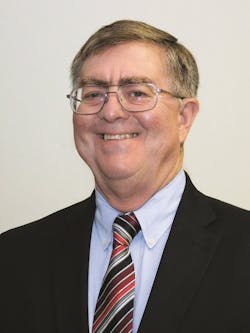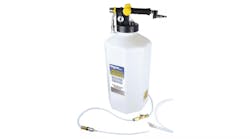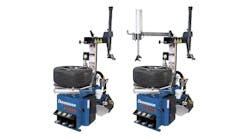New Tire Industry Hall of Fame member and outgoing Tire Industry Association (TIA) CEO Dr. Roy Littlefield can claim a number of well-deserved achievements and accolades
Under his direction, TIA’s membership has grown to an all-time high of more than 13,000 people — up from 2,700 when he was named the association’s CEO some 18 years ago.
On his watch, TIA significantly expanded its industry-leading training programs to educate and certify more than 200,000 tire technicians.
As the association’s first, full-time government affairs director — a role he took on when he joined TIA’s predecessor, the National Tire Dealers and Retreaders Association (NTDRA), in 1978 — Littlefield has ceaselessly championed the cause of independent tire dealers at the federal, state and local levels.
He also added structure and stability to TIA, while helping the association and its members navigate a wide range of unprecedented internal and external situations, most recently the COVID-19 pandemic.
And as other trade associations have struggled to stay in the black — with some falling by the wayside completely — Littlefield leaves TIA’s balance sheet in its strongest-ever position.
But the association’s longtime leader says many of his proudest moments at the helm of TIA were accompanied by little — and in most cases, zero — fanfare.
“There are a lot of things we do that get a lot of visibility that I’m proud of and there are a lot of things we do that don’t get a lot of visibility that I’m also proud of.”
Many of the latter have involved supporting TIA members and their families during difficult personal situations.
Years ago, one TIA member — a tire dealer who had been struggling with grave health issues — died unexpectedly.
“We were able to go in and work things out between his tire supplier and his family, so the family didn’t lose anything,” says Littlefield.
“We’ve had situations where a dealer and his wife have gotten divorced,” leaving the dealer’s business “in shambles,” he recalls. “And we’ve been able to go in and help.
“When a tire dealer gets an IRS audit, it’s a big deal. They feel so threatened — like they don’t stand a chance. We go out to them and help. Those are the moments I’m very, very proud of.”
The dealer’s champion
Littlefield, who is from New Hampshire, did not grow up in the tire industry. And running a trade association had never occurred to him when he was in college.
“I came to Washington D.C. to go to grad school — something I had wanted to do all my life,” he says.
“One day, I walked into my senator’s office and asked, ‘Can I be a volunteer?’ A couple of months later, they offered me a job at $10,500, which in 1975 was a lot of money.
“In fact, I never told my parents what I made because I didn’t think they were making that much.”
Not long afterwards, the senator was upended in a surprise defeat. But before leaving office, he found jobs for all of his staff members.
“I was finishing up my dissertation and wanted to go back to New Hampshire to get involved in politics up there. I was applying for jobs, but I wasn’t getting very far.”
One Sunday afternoon, he applied to seven ads in The Washington Post — and soon had seven job interviews in hand.
“I then realized that working on Capitol Hill for several years was marketable in D.C., but it wasn’t very marketable in mill towns in New Hampshire.”
Littlefield accepted a job at the NTDRA, reporting to the late Phil Friedlander, the association’s then-president, who put him to work as the group’s first government affairs director.
While benefiting from the guidance of several “wonderful mentors,” including Russ McCleery, Littlefield made it his mission to learn as much about the NTDRA’s members as possible.
“When I came in, I thought it was important to go out and meet tire dealers. Every time Congress was in recess, I would make an appointment to go to a retread shop or a commercial dealer or a retail store and talk to the people who were working there about what the important issues were.”
In those days, the classification of scrap tires was a big point of contention. At the time, Littlefield estimates, there were more than 1,200 scrap tire piles scattered throughout the United States.
He led the charge to convince Congress to not list tires as hazardous waste — a major victory for the NTDRA and its members.
“The industry then came together and got state funds to clean up scrap piles. I think the number of scrap piles in the U.S. has gone down to fewer than 60.”
In the early 1980s, the National Highway Traffic Safety Administration began imposing onerous fines for “noncompliance” with tire registration laws that were on the books.
“We started seeing fines in high numbers — $20,000 and $40,000 and even $60,000. That’s when we pushed for voluntary tire registration,” which became another win for tire dealers.
Over the years, Littlefield has tracked the rise of mega-retailers and remembers when car manufacturers ramped up their tire programs. He also has witnessed tremendous consolidation — especially at the tire dealership level — and newer developments, like e-commerce.
“You get into situations where big companies are competing directly with small, independent tire dealers.”
That has not changed, he says. Even today, “the challenges are always coming from different angles. Every time you think you’ve solved a problem, there’s something new.
“But despite all these changes, independent tire dealers still make up the large majority of tire retail sales. They’re still important. They’re still viable.”
And in Littlefield’s eyes, they help make the tire industry unique. “It’s not like some industries — like service stations — where the landlord is the supplier and controls everything. These dealers are truly independent and control their own businesses. There’s great pride and there’s a great thirst for learning and getting better all the time.
“I’ve traveled overseas,” he says. “I’ve seen other associations. And I think what we have is very unique. I’m proud of it.”
More than business
Looking forward to retirement, Littlefield plans to stay active. “I’ve always been more comfortable when I’ve been busy,” he says.
In addition to spending time with his family, he hopes to help TIA and his eventual successor, especially in the government affairs arena.
“I hope I can stay in some capacity to do that.”
He also will continue to teach American history and politics at The Catholic University of America, which established a scholarship in his name several years ago — “another humbling experience.
“I’d like to write two or three books. I did my dissertation on” early newspaper industry mogul William Randolph Hearst.
“There are different events in his life that would be interesting to expand on.”
And Littlefield intends to stay in touch with the many tire industry friends he’s made. “The association is like one big family,” he says. “Over the years, I’ve gone to baptisms and weddings and funerals” of members and their relatives.
“I’ve watched their kids grow up. They’ve watched my kids grow up. It’s more than just a business relationship.
“Everybody has been so kind and so gracious and so giving. It’s a unique group of people who look out for each other.”




